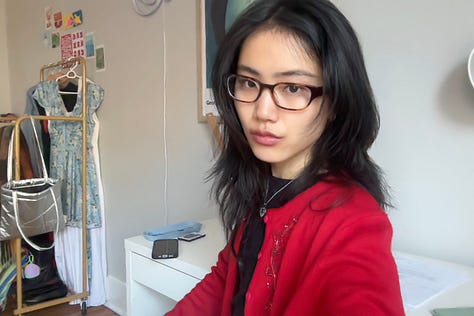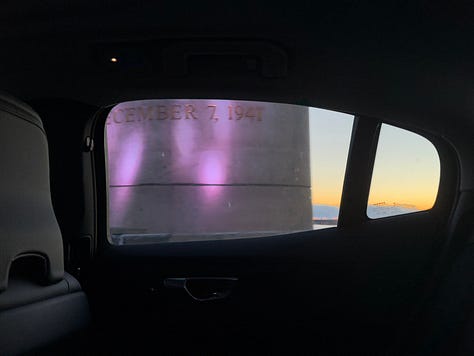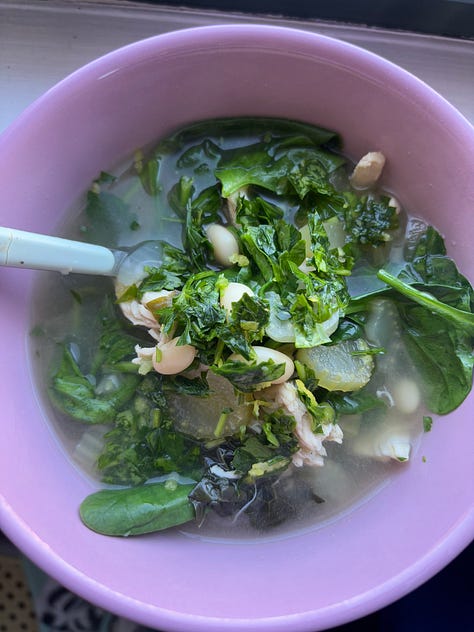In my final semester at Yale, I’m taking a class called Daily Themes where the only assignment is to write 250 words every (week)day. The course was first taught in 1907, and it is Yale’s oldest and longest-running class. Its thesis lies in the idea that to become a better writer, you need to practice with consistency and intention.
As requested, I will be sharing the Daily Themes prompts and my own responses from the week. Our first lecture was on METAPHOR.
I hope you enjoy. Let me know what you like and what you don’t. If you paste the themes you write into the comments, I’ll choose a few of my favorites to include in the next letter. Be sure to include the number you’re responding to.



Before we begin, a few notes:
There are four main uses for metaphors:
Aesthetic effect
Conciseness
Make abstractions concrete
Describe things that lack a literal name (like having a crush so insane you feel like exploding)
Every metaphor has a tenor (the thing you’re invoking) and a vehicle (the concrete image or idea you’re using for comparison).
In the sentence “Her eyes were blue sapphires,” the eyes are the tenor and the blue sapphires are the vehicle.
Metaphors are inclusive of simile, analogy, and personification.
A dead metaphor has been overused to the point of obsoleteness. A dying one is on its way to being dead. A fresh metaphor is new and revealing, but still apt. My professor called it a “swift, violent twist of language.”
The verb “understand” is a dead metaphor. It’s an ordinary word—you may have forgotten it was even a metaphor in the first place.
Each theme should be between 250-300 words. If the prompt has two parts, split the word count accordingly.
Week 1 Prompts:
Write a theme to describe an object, event, place, or situation using at least six metaphorical words—ranging from very fresh to very dead. Choose metaphors that work together, or at least belong in the same universe (e.g. all belong in the ocean, or all in a factory). The goal is not to let them “mix.”
Choose any single abstract word that especially interests you. Study its history from its first appearance in the Oxford English Dictionary and, with that etymology in mind, write a theme that plays on the metaphor implied in its root. You can make the word prominent in your theme or keep it subtle.
Write two versions of the same half-length theme about anything at all. In the first one, use a lot of abstract Latinate words; in the second, use the more concrete Germanic equivalents of those words. Given both themes should “say” as close to the same thing as possible, you’ll need to interpret the Latinate into Germanic—favoring the gist over the literal meanings.
Employ either personification or zoomorphism to vivify a condition or state of mind.
Either
Invent a fresh metaphor to describe your hometown—or any place with an equivalent degree of solidity and complexity Emphasis should be on freshness.
Write an extended metaphor to describe anything at all. Make the tenor you choose complex enough to correspond with various qualities of the vehicle, which you’ll be breaking out over the course of the theme.
Everyone is pretty sleek and rounded in Palm Beach—unlike New York, where people’s faces are as thin as credit cards. - Martin Amis, “Palm Beach, Don’t You Love It?” (1979)
My Week 1 Themes:
The mahogany wooden panels were dark and silken, like bars of chocolate plastered to the walls. There were enough people for the party to feel full, but not overcrowded. A few sour grapes were in the corner, talking to no one but each other. A semi-circle formed around Daniella, who was pontificating about the history of the room, running her fingers along the polished wood as she spoke. It once belonged to an amorphous group of artists who used it as a studio and a showroom. Now it held parties. The ice sculpture lacked imagination, the concept only half-baked. Daniella didn’t have time to do it herself; she hired a company to deal with the decor. They were eye candy experts. She had practiced her speech in front of the mirror that morning, miming the hand gestures that would later appear instinctive, adding color to her words. Afterward, Daniella tied her thick hair into one long braid, a piece of black licorice coiled around itself in perfectly interlaced crisscrosses. Not a strand was out of place. In the evening, her elbow knocked into Ella’s forearm, spilling her glass of Chardonnay on the carpet. “I’m sorry,” Daniella murmured, “I couldn’t see you clearly.” Ella’s hair was cotton candy, thin and wispy, dyed light pink at the tips of her platinum blonde. It almost disappeared when she turned her head too quickly and caused a gust of wind to brush the nape of her neck. “Don’t worry, it won’t stain,” Ella replied. “It’s white.” Daniella nodded and her eyes flickered, scanning the room for someone else to talk to.
My friend called me last night to tell me she’d started a new book called The Artist’s Way. Most people don’t think they’re capable of being “artists”, she explained, but the workbook is designed to convince them otherwise. Everyone possesses an inner creativity, but our fear of failure or humiliation prevents us from channeling it. Or so she says. I haven’t been able to produce anything in months. I’ve designed a morning routine conducive to writing: I make my bed, stretch my arms and legs, and set a cup of coffee beside my computer. I end up staring at the blank page for hours. I think it has to do with the fact that I cannot breathe. I’ve been so congested that I haven’t smelled anything since the wafts of pine on the Christmas-tree-lined sidewalks in New York. That was mid December. And when I try to exhale out of my mouth, there is no air. Pygmalion has been appearing in my dreams, his carving tools against the cold white stone, gradually revealing a new form. And then there’s the breath. He whispers a prayer, Aphrodite breathes through him, and the marble woman softens into flesh. The spirit is transferred through the breath; it fills Galatea with life. I remember the myth from high school Latin class: the sculptor marries his creation, and they have a daughter. My dream doesn’t go that far. It lingers on the breath—I can see the particles shooting out and rearranging themselves into something resembling a soul. I will be able to write once I can breathe again, I told my friend. She didn’t understand, and hung up the phone.1
I don’t need a response right now. I just request that you consider the propitious aspects of my vision. Look outside; the park is verdant, and this is temporary. It’s almost as good as the real thing; try and ignore the skyscrapers. We can hibernate like bears in the winter. The elevation is worse in Denver, anyway. You can barely breathe. I’m being inundated with concern from my parents. They’ll provide for us now. They mean well. My only admonition is that if you provoke them, the ire they can unleash is sensational. When I was an adolescent, they told me that marriage is no vacation. You have to remain vigilant. I didn’t comprehend then, but now I know that diminutive problems inevitably coalesce, and one day your wife might tell you that the house in the mountains is no longer yours.
I don’t need an answer right now. I just ask that you keep the good parts of my idea in mind. Look outside; the park is green, and this will be brief. It’s almost as good as the real thing; try and ignore the skyscrapers. We can hide away like bears in the winter. The height above sea level is worse in Denver, anyway. You can barely breathe. I’m being flooded with concern from my parents. They’ll pay for our lives now. They mean well. My only warning is that if you try them, the anger they can unleash is startling. When I was a teenager, they told me that wedlock is no holiday. You have to keep an eye out. I didn’t understand then, but now I know tiny problems will naturally build, and one day your wife might tell you that the house in the mountains is no longer yours.
The seed buried itself in her digestive tract, which was odd, because she thought it would have chosen her heart. At first it was as small as a piece of food she hadn’t chewed enough before swallowing. She felt the lump in her intestines, and though it wasn’t unpleasant, it was still strange. It gently prodded her from the inside, reminding her of its existence. When she sat down for breakfast, she realized she had no appetite. She watched the steam from her plate of runny eggs rise in coiled wisps and evanesce. Her stomach throbbed. The seed within her sprouted limbs that began to slide through her organs, generating heat from the friction of skin on skin. She couldn’t tell if it felt good, like how hot broth seeps into your crevices and softens them, or if she was about to throw up. Its arms stretched up her buzzing chest and through her neck until it wrapped its slinky fingers around her brain. It touched a nerve, and suddenly she couldn’t think about anything except Noah holding the door open for her, his hand brushing against her shoulder when she walked past him, as if it were accidental. Maybe it was. The slithering inside of her was everywhere now. Floating, cascading, sparkling, singing through her body, conjuring images of his open mouth, his blue-green eyes, his hair matted from wearing his hood in the rain. It curled around her tongue, coaxing her to spell out his name. Noah, she said aloud, the sound beginning behind her rounded lips and ending in the back of her throat. She closed her eyes, and she saw him, bright and clear.
New York is a teenage girl. She knows everything with a conviction that only comes with having experienced very little–what to wear, where to go for dinner on a Friday night, how to act demure in front of strict teachers and intriguing, but not threatening to the table of popular kids. New York operates on the same sixth sense that comes quite naturally to thirteen year olds. Downtown streets sparkle just enough to light the sidewalks without inviting trouble. The Subway trains arrive at the platform in synchronicity, and you can hop across the platform from local to express without waiting a minute, as if the metro stars aligned. She is temperamental, of course. The summers are too sweaty and too hot, the garbage melts and the air smells like smoke and chicken. The winters are frigid and the wind is so brutal it knocks you over if you aren’t actively pushing against it. But even amidst the most hormonal mood swings, there are moments of bliss. Fifth Avenue glistens during Christmas with lights. Last year, they pumped the smell of fir into the air. The Mr. Softee ice cream trucks in August sing their song and delight the kids with missing teeth as much as their parents, and their grandparents. She is growing quickly, she changes her mind every day, she has a million personalities that she picks and chooses from. She likes to dress up and steal her mother’s lipstick when she’s at work, but she’s still a kid, she wants to play and sing and yell and run up and down, up and down.
Next week’s themes are on SYNTAX. Thank you for reading, and please do share your writing in the comments!!!! Reading each other’s work is the most fun of all.
The word I chose was inspire, which comes from the Latin word for “to breathe into”



I want to try to do this every day; who knows if that’ll be successful but this is one I wrote Monday with the first prompt:
A thick coating on the back of her throat. Sister Helena jerked and bounced to the music, closing her eyes, breathing deep then shallow, four in, four held, four out. From under here, the dance floor sparked and pulsed mutedly, like the thrum of a reflex hammer on the knee. She had finally let her hair down, but at what cost? Here, shirt taut over her pale stomach, feet shoved and blistered into pinching shoes, knees bruised after a year and a half of every day kneeling, it felt like time was running out. Twenty-six and this was the first time she had drunk alcohol; tequila a cool and slippery fish down her gullet. She didn’t want to feel it, but her body broke into song. Glittery notes poured into her fingertips, her toes, her hips, those long-forgotten places ready to be kicked into gear. She grabbed Alison, her high-school friend, who lent her this tiny shirt and these thankless shoes, and spun her onto the dance floor, hand on her waist, the longing gnawing and nagging at her. But now all those fireworks were gone; here, an hour past, the buzz long worn off, happiness was a warm gun. Happiness was sweat prickling under her arms, the backs of her knees, her wan forehead. Happiness was the nausea she felt seeing Alison’s body sway against some faceless man, his greedy hands against her middle. Happiness was getting another drink, and when the bartender asked her name for the tab, stopping herself before she told him, “Sister Helena of the Society of the Sacred Heart of Jesus.”
What you wrote for the fourth prompt is fascinating. It’s beautifully written—I’ve read it multiple times. So vivid, honest, and deeply relatable, as I have felt that very same seed. I think I’m drawn to feminine bodily experiences in writing. I believe I’ll carry this text with me for a while—you put into words something I’ve felt but never articulated. And you’ve inspired me to believe that if I have felt it, I can, with practice, write about it too. Thank you for sharing these exercises from your class. It feels like you’ve shared a little treasure with us, aspiring writers.